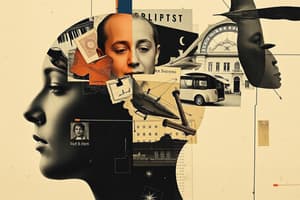Podcast
Questions and Answers
What characterizes a continuous distraction in a workspace?
What characterizes a continuous distraction in a workspace?
- A constant background noise (correct)
- Occasional loud noises
- Unexpected interruptions
- Fluctuating sounds from conversations
What is one way to effectively remove distractions while working?
What is one way to effectively remove distractions while working?
- Taking frequent breaks from work
- Being active and engaged in work (correct)
- Ignoring distractions completely
- Admitting distractions and discussing them
How does perception primarily depend on sensory organs?
How does perception primarily depend on sensory organs?
- They provide the necessary stimuli for perception (correct)
- They interpret emotions and thoughts
- They enhance memory retention
- They eliminate distractions in the environment
What is an example of an error in perception?
What is an example of an error in perception?
What influences the speed and clarity of perception related to personal interests?
What influences the speed and clarity of perception related to personal interests?
What role do memory images play in perception?
What role do memory images play in perception?
Which factor does NOT directly affect perception?
Which factor does NOT directly affect perception?
What is 'discontinuous distraction' characterized by?
What is 'discontinuous distraction' characterized by?
What is an example of a misinterpretation of a stimulus that can lead to an illusion?
What is an example of a misinterpretation of a stimulus that can lead to an illusion?
Which scenario can lead to inaccurate perception due to the overloaded sensory system?
Which scenario can lead to inaccurate perception due to the overloaded sensory system?
What is the term for imaginary perceptions where an individual hears or sees something not perceived by others?
What is the term for imaginary perceptions where an individual hears or sees something not perceived by others?
How does inadequate stimulus affect perception?
How does inadequate stimulus affect perception?
According to the definition provided, what is essential for learning to occur?
According to the definition provided, what is essential for learning to occur?
Which condition is NOT associated with impaired perception?
Which condition is NOT associated with impaired perception?
What role does limited attention play in perception?
What role does limited attention play in perception?
Which of the following statements about learning is true?
Which of the following statements about learning is true?
What is classical conditioning primarily concerned with?
What is classical conditioning primarily concerned with?
Which form of learning involves using muscles primarily?
Which form of learning involves using muscles primarily?
In problem solving, which cognitive abilities are particularly emphasized?
In problem solving, which cognitive abilities are particularly emphasized?
What is a significant factor influencing learning related to the environment?
What is a significant factor influencing learning related to the environment?
Which of the following is NOT considered a gateway of knowledge in perception learning?
Which of the following is NOT considered a gateway of knowledge in perception learning?
How does maturation affect learning readiness?
How does maturation affect learning readiness?
What type of learning involves forming attitudes towards different objects or situations?
What type of learning involves forming attitudes towards different objects or situations?
Which factor does NOT influence learning according to the physiological factors?
Which factor does NOT influence learning according to the physiological factors?
What does an unconditioned response (UR) refer to in classical conditioning?
What does an unconditioned response (UR) refer to in classical conditioning?
In operant conditioning, what is the main distinction between positive reinforcement and negative reinforcement?
In operant conditioning, what is the main distinction between positive reinforcement and negative reinforcement?
What are the four steps involved in observational learning, according to Albert Bandura?
What are the four steps involved in observational learning, according to Albert Bandura?
Which of the following best defines insight learning?
Which of the following best defines insight learning?
What is a conditioned stimulus (CS) in the context of classical conditioning?
What is a conditioned stimulus (CS) in the context of classical conditioning?
What does spaced learning refer to?
What does spaced learning refer to?
How does aversion therapy utilize concepts from classical conditioning?
How does aversion therapy utilize concepts from classical conditioning?
What is the primary function of reinforcement in operant conditioning?
What is the primary function of reinforcement in operant conditioning?
What principle is the Trial and Error Theory of Learning based on?
What principle is the Trial and Error Theory of Learning based on?
In Pavlov's experiment, what was the unconditioned stimulus?
In Pavlov's experiment, what was the unconditioned stimulus?
What does the concept of a Conditioned Response (CR) entail?
What does the concept of a Conditioned Response (CR) entail?
Which of the following learning theories is NOT mentioned as a primary theory?
Which of the following learning theories is NOT mentioned as a primary theory?
What outcome did Thorndike observe in his experiments with cats?
What outcome did Thorndike observe in his experiments with cats?
Which aspect does the Law of Association primarily explain?
Which aspect does the Law of Association primarily explain?
What role does the bell play in Pavlov's experiment?
What role does the bell play in Pavlov's experiment?
What does Observational Learning primarily involve?
What does Observational Learning primarily involve?
Flashcards are hidden until you start studying
Study Notes
Distractions
- Distractions in the work area can interfere with attention.
- Continuous distractions are consistent, like the sound of a radio. Adjustment to these distractions is quick.
- Discontinuous distractions are irregular, like hearing a voice now and then. They are harder to adjust to and can interfere with work.
- To minimize distractions, focus on your work, ignore distractions, and incorporate them into your work if possible.
Perception
- Perception involves interpreting information from our senses to understand objects, events, and relationships.
- Sense organs and the brain are essential for perception; a lack of functioning in either can affect it.
- Memory images of past experiences help us understand present stimuli.
- Personal interests, acquired interests, needs, desires, beliefs, opinions, and cultural ideals can influence our perception.
Errors in Perception
- Illusions are misinterpretations of real perceptions. For example, mistaking a rope for a snake in the dark.
- Hallucinations are imaginary perceptions not shared by others. For example, an alcoholic seeing "pink elephants."
Causes of Inaccurate Perception
- Defective sense organs: Myopia, deafness, or other sensory issues can cause inaccurate perception.
- Inadequate stimulus: Weak or vague stimuli might be difficult to perceive correctly.
- Too many stimuli at once: It's challenging to accurately perceive one stimulus when multiple stimuli are present.
- Poor health: Illness can impair the functioning of sense organs, leading to inaccurate perceptions.
- Limited attention: Trying to process more than our capacity can result in inaccurate perception.
- Figure merges with the ground: Objects resembling their surroundings are more challenging to perceive, like a white patch on a white wall.
- Lack of guidance: Without knowledge of what to perceive, perception can be inaccurate.
Learning
- Learning involves a relatively permanent change in behavior due to practice.
- It is a process that leads to both positive and negative changes in behavior and involves acquiring, changing, or discontinuing existing behaviors.
- Learning helps individuals adapt and adjust, and is goal-oriented, universal, continuous, and contributes to a balanced personality.
Types of Learning
- Classical conditioning: Association between two stimuli: an unconditioned stimulus (US) and a conditioned stimulus (CS).
- Instrumental conditioning: Association between a response and a stimulus. It allows individuals to adjust behavior based on consequences, including positive and negative reinforcement and punishment.
- Perception learning: Knowledge gained through the five senses: sight, hearing, taste, smell, and touch.
- Verbal learning: Using signs, pictures, symbols, words, figures, sounds, and voices to learn.
- Motor learning: Primarily involving muscle use, like learning to walk, swim, or play instruments.
- Concept learning: Forming mental images representing generalized ideas about things, people, or events.
- Problem-solving: Utilizing cognitive abilities like thinking, reasoning, and imagination to find solutions.
- Attitude learning: Developing favorable or unfavorable responses to objects, people, or situations, influencing how we learn a subject.
Factors Influencing Learning
- General Factors:*
- Maturation: The individual's developmental stage influences their readiness to learn.
- Age: Older children tend to have more patience for learning.
- Nature of learning material: Easy or difficult material influences learning.
- Practice: Practice enhances learning.
- Environment: A stress-free, quiet environment with good ventilation, seating, and lighting is conducive to learning.
- Gender differences: There are no significant gender differences in learning ability.
- Previous experience: Prior knowledge impacts learning.
- Physiological Factors:*
- Sense perception: Weaker senses can limit learning.
- Physical health: Poor health (fever, cold, pain) interferes with learning.
Law of Association
- We learn through associating ideas, leading to one idea triggering another. For example, thinking of thunder automatically brings to mind lightning.
Theories of Learning
- Learning theories focus on environmental influences like associations, reinforcements, punishments, and observations.
- Trial and Error Theory (Edward Thorndike): Learning occurs through trying different strategies, with incorrect responses decreasing over time.
- Learning by Conditioning (Ivan Pavlov ): This theory involves associating a neutral stimulus with an unconditioned stimulus to create a conditioned response.
- Theory of Operant Conditioning (B.F. Skinner): Learning occurs through consequences of actions. Positive consequences reinforce behaviors, while negative consequences deter them.
- Theory of Insightful Learning (Wolfgang Kohler): Learning through sudden understanding, without trial and error, like a "flash of insight."
- Observational Learning (Albert Bandura): Learning by observing and imitating the behavior of others.
Methods of Learning
- Learning by understanding the meaning: Focuses on comprehension rather than rote memorization.
- Spaced vs. Unspaced Learning: Spaced learning involves studying with time intervals, while unspaced learning is massed learning without breaks.
- Part vs. Whole Learning: Part learning involves breaking down material into smaller parts, while whole learning focuses on learning the entire material at once.
Studying That Suits You
Use AI to generate personalized quizzes and flashcards to suit your learning preferences.




